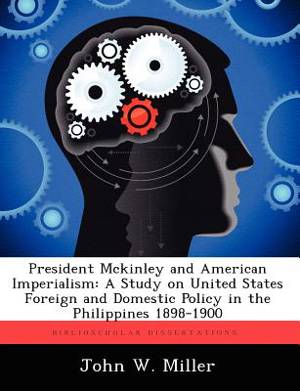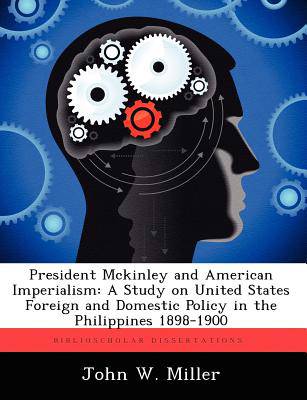
- Afhalen na 1 uur in een winkel met voorraad
- Gratis thuislevering in België vanaf € 30
- Ruim aanbod met 7 miljoen producten
- Afhalen na 1 uur in een winkel met voorraad
- Gratis thuislevering in België vanaf € 30
- Ruim aanbod met 7 miljoen producten
Zoeken
President Mckinley and American Imperialism
A Study on United States Foreign and Domestic Policy in the Philippines 1898-1900
John W Miller
Paperback | Engels
€ 78,95
+ 157 punten
Omschrijving
William McKinley actively sought territorial expansion during his tenure as President of the United States as a means to stimulate the domestic
economy and increase American international prestige. This expansion was critical to the continued economic growth of the United States and
its emergence as a world power. This report looks at McKinley's expansionist foreign policy and asserts it was tied directly to attaining
economic markets and prosperity for the United States and not, as is commonly believed, a moral duty to help our ?little brown brothers.?1
This foreign policy designed to achieve economic growth conflicted with what many believed were the very foundations of our Constitution,
the belief that no man should be ruled by another without consent. America had gained its independence from Great Britain because of the
widespread acceptance of this belief and now, a little more than a hundred years later, the country was contemplating colonialism because it
was sound business.
economy and increase American international prestige. This expansion was critical to the continued economic growth of the United States and
its emergence as a world power. This report looks at McKinley's expansionist foreign policy and asserts it was tied directly to attaining
economic markets and prosperity for the United States and not, as is commonly believed, a moral duty to help our ?little brown brothers.?1
This foreign policy designed to achieve economic growth conflicted with what many believed were the very foundations of our Constitution,
the belief that no man should be ruled by another without consent. America had gained its independence from Great Britain because of the
widespread acceptance of this belief and now, a little more than a hundred years later, the country was contemplating colonialism because it
was sound business.
Specificaties
Betrokkenen
- Auteur(s):
- Uitgeverij:
Inhoud
- Aantal bladzijden:
- 52
- Taal:
- Engels
Eigenschappen
- Productcode (EAN):
- 9781249834359
- Verschijningsdatum:
- 17/10/2012
- Uitvoering:
- Paperback
- Formaat:
- Trade paperback (VS)
- Afmetingen:
- 189 mm x 246 mm
- Gewicht:
- 108 g

Alleen bij Standaard Boekhandel
+ 157 punten op je klantenkaart van Standaard Boekhandel
Beoordelingen
We publiceren alleen reviews die voldoen aan de voorwaarden voor reviews. Bekijk onze voorwaarden voor reviews.











